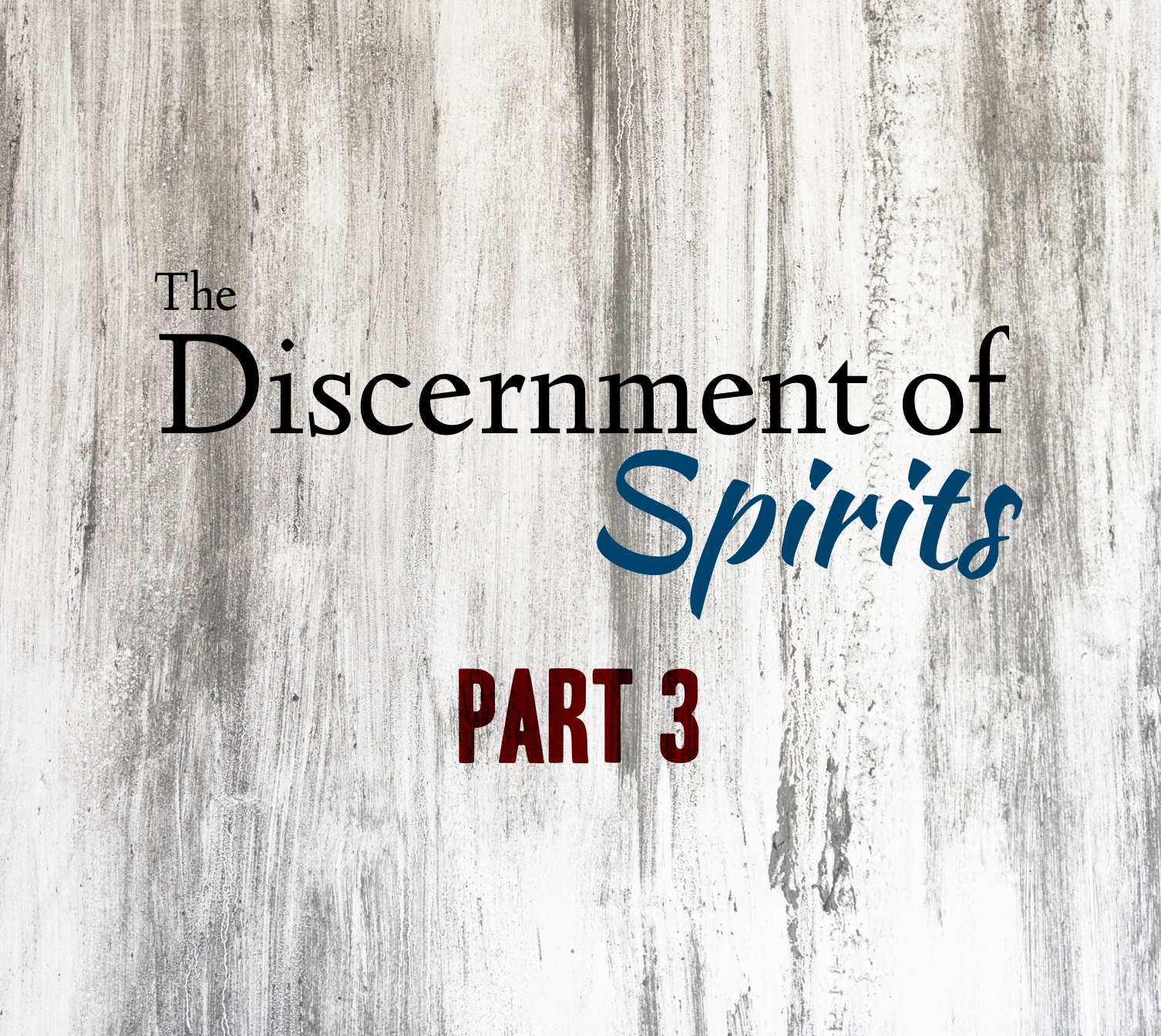This is part three of a three-part series on St Ignatius’ Rules for the Discernment of Spirits. Read part one and two before continuing.
The 14 rules discussed in last week’s post are very insightful and help us look within to see how the evil spirit tries to derail us and how the good spirit tries to nudge us closer to God. Ignatius offers a second set of eight rules or guidelines that speak to the more subtle ways the spirits move. We move from the broad movements and tactics, from consolation vs desolation, to the nuances and subtleties we find with discernment. Let’s face it, discernment in the spiritual life is not easy to begin with. In this second list Ignatius reminds us just how complex it can be!
When we stray or make a mistake or sin it’s more often than not because of the subtle influence of the evil spirit. Mortal sins, which require full knowledge and consent, I think are rare – often the evil spirit dupes us. We don’t always have full knowledge or awareness of what we’re doing until it’s too late. Often the temptations we have and give into will be disguised as good things. Let’s take a look at Ignatius’ insights on this.
First he offers us a foundation:
RULE 1
While the good spirit tends to give joy, peace, and encouragement, the evil spirit can raise subtle fears, doubts, or dissatisfaction about the course we’re taking.
Here we see that subtlety is a tactic of the evil spirit. Good usually tries to make itself clear.
RULE 2
If we experience a sudden consolation and joyful peace without any apparent cause or reason, it is from God.
 This is often described as St Paul being blinded by the consoling light of Jesus, where he is transformed. It comes from out of the blue; there is no explanation. This is certainly more rare, but if it does occur just bask in it. The evil spirit doesn’t have much of a reason to cause consolation for no reason, with no motive.
This is often described as St Paul being blinded by the consoling light of Jesus, where he is transformed. It comes from out of the blue; there is no explanation. This is certainly more rare, but if it does occur just bask in it. The evil spirit doesn’t have much of a reason to cause consolation for no reason, with no motive.
Ignatius experienced a moment of sudden consolation when he was sitting on the banks of the River Cardoner in Spain. In his Autobiography he says that “the eyes of his understanding were opened.” He saw all creation within the context of God. All seemed to make sense.
RULE 3
When consolation does occur because of a cause, like a thought or an event, it may be from the good spirit trying to strengthen and encourage us, or from the evil spirit trying to distract us or cause us to focus on ourselves.
In other words, don’t assume consolation, when it has an identifiable cause, is from God. Working in ministry I often feel God’s consolation when I reflect on how the work I do can deeply touch the people I minister to. When I hear affirmations from people I feel good about myself. I feel like I’m doing God’s work. And that indeed can be God encouraging and affirming me. But I also notice that it can cause me to become prideful. Evil is always trying to get us to focus on ourselves in unhealthy amounts. This segues well into the next three rules where Ignatius explains more about this deceptive or questionable consolation:
RULE 4
For one who wants to pursue good, the evil spirit is often disguised as an “angel of light” appearing like the good spirit. Our attention may be shifted to other “good” things and we may eventually become prideful or selfish.
Ignatius mentions the downfall of pride a great deal. This is because the evil spirit often works to convince us that what we’re doing is good, that we’re God’s gift to the world, and so we puff ourselves up, feel good about ourselves, and eventually become blinded to our serving our ego, to leaning into selfish ways. This is precisely the trap I can fall into in ministry. We can fall into it whenever we’re doing good things. Feeling good about doing good things is not inherently bad, and often we are indeed serving God’s kingdom and caring for others. But sometimes the evil spirit can hijack this, use this to distract us, turning us from our original trajectory of growing closer to God toward a service of the self.
RULE 5
The course of a consolation is likely to be from the good spirit if we find ourselves growing closer to God at the beginning, middle, and end. If, on the other hand, we notice the path of our experience begins as good but slowly becomes corrupted and moves toward selfish thoughts and inclinations (and even desolation), it is likely the evil spirit who has hijacked the consolation.
Again, I can find this in myself, where I feel good about my ministry and all I’m doing, but then I find myself not praying, not cultivating my spiritual life, almost forgetting about God. The beginning, middle, and end don’t match up. There’s a corruption that happens with the consolation – it begins serving the ego rather than God or others. This can happen easily in families when we’re so focused on the good we’re doing at work or in a volunteer group and we begin neglecting our spouse or children. And if they complain we might even find ourselves blaming them for not appreciating the good we’ve done.
Ignatius’ 6th rule can help us when we find this happening.
RULE 6
If we gave in to false consolation and were duped by the evil spirit we must resolve to examine what happened and where we might have been led astray. Then, learning from our mistakes, we should get back on track and move forward.
Again Ignatius takes us back to this examination of self. If I begin arguing with my wife on how much time I spend on my ministerial work and how little time I spend at home, the evil spirit may be doing something. I need to pause and take a step back to assess what’s going on. Is the evil spirit hijacking a consolation, a gift from God? Am I giving in to pride or ego? What can I do to resist and get back on a healthy path?
Notice the subtlety in how the evil spirit can creep in. In Rule 7 Ignatius offers another helpful metaphor:
RULE 7
If we’re maturing in the spiritual life the good spirit is gentle like a drop of water quietly being absorbed by a sponge, while the evil spirit is harsh and disturbing like a drop of water hitting a stone.
The other day I was praying with the passage where Jesus said, “I no longer call you servants, I call you friends.” I imagined Jesus as a friend and what that’s like. And I felt such peace and consolation. The feeling was like the gentleness of water being absorbed by a sponge. I even imagined how comfortable I’d feel with Jesus coming to my home and just spending time with him… Ignatius has even talked about the good spirit being like that: the warmth and joy of welcoming a friend into your home; and the evil spirit being like a burglar banging on the door, trying to break in.
RULE 8
When we experience sudden unexplained consolation from God (as in Rule 2) and find a sort of “afterglow” of exhilaration and feeling on fire for God, we can be tempted to make quick and rash decisions. Just as we shouldn’t make important decisions in desolation, we should refrain from making big decisions in the extremes of blinding consolation. Wait until things settle and then engage in a thoughtful discernment before making any major choices.
All of us have probably impulsively made a decision because we’re just so on fire and excited by something. My wife Sarah and I were so taken with the portrait mode on the iPhone X and so excited about how we could take amazing looking photos of our toddler with it that I impulsively went to the Apple Store and spent way too much money and bought them for us. Sarah even said, “Are you sure we should buy them?” I justified it. It’s common to impulsively buy things and then later regret it when the “glow” has worn off. This is why it’s often advised to wait a couple weeks for your excitement to settle down and then when your head is clearer, to then make a decision. Ignatius is saying the same thing here.
There was once a man who went through RCIA who wanted to become Catholic and then become a priest. Even before he started the RCIA process he already had a detailed plan and timeline for theology study and priesthood. He was on fire with love of God from his conversion – still in the “honeymoon” phase you could say. What this person would benefit from would be a slowing down, a waiting for some calm so he can discern well his desires for pursuing priesthood.
People rashly jump into marriage for similar reasons. Sometimes the glow of consolation can blind us.
Discerning the subtle movements of the spirit can be hard and it can be complicated. This is why it can be so beneficial to have a spiritual director, a mentor, or a trusted friend who can help us discern these movements, to notice things we can’t, to see how we’re blinded.
There’s the story of an engaged woman who might benefit from Ignatius’ rules for the discernment of spirits. There are lots of things her fiancé is uncomfortable talking about with her, including faith, intimacy, and money. She’s keeping certain things about herself in the dark, secret from him. It seems the evil spirit may have hijacked some initial consolation in their relationship – the beginning, middle, and end are not all steering them toward the other or God. There’s a sense of disquiet and agitation in their relationship, like water harshly hitting a rock. There are lots of red flags, but she seems to be blinded to them.
But the wedding date’s set. Things are booked. Money is paid. Marriage isn’t going to magically improve their communication or uncover what needs uncovering. This person could use a good spiritual director who can point out these red flags, these signs that the spirit not from God may be leading her astray.
Pope Francis in his most recent apostolic exhortation, Rejoice and Be Glad, says, “Along this journey, the cultivation of all that is good, progress in the spiritual life and growth in love are the best counterbalance to evil.” Like Ignatius, the pope believes the reality of this battle between good and evil. In this document, Francis has a section on discernment and, as a Jesuit, it’s clear he’s familiar with Ignatius rules for the discernment of spirits. When something presents itself, he says,
“We have to decide whether it is new wine brought by God or an illusion created by the spirit of this world or the spirit of the devil. At other times, the opposite can happen, when the forces of evil induce us not to change, to leave things as they are, to opt for a rigid resistance to change. Yet that would be to block the working of the Spirit. We are free, with the freedom of Christ. Still, he asks us to examine what is within us – our desires, anxieties, fears and questions – and what takes place all around us – ‘the signs of the times’ – and thus to recognize the paths that lead to complete freedom. ‘Test everything; hold fast to what is good’.” (1 Thess 5:21)
The discernment of spirits should ultimately aid us in discovering the true self, who God made us to be, and help us put aside the false self, the ego which so often drives our many choices. The pope sums it up well:
“Discernment, then, is not a solipsistic self-analysis or a form of egotistical introspection, but an authentic process of leaving ourselves behind in order to approach the mystery of God, who helps us to carry out the mission to which he has called us, for the good of our brothers and sisters.”
A process that helps us focus outward, toward our sisters and brothers… It’s a process of growing in knowledge that seeks to lead us toward life, peace, and a healthier relationship with God, others, and self. It’s helpful to remind ourselves that the good spirit is our advocate, continually wanting to encourage us and give us peace.
But as we’ve seen, it’s complicated. An objective third party like a spiritual director or mentor can be very helpful in making sense of the subtle movements of the heart.
You can download a PDF of the second set of rules mentioned above by clicking here.
Listen to the podcast version of this post…









Hi Andy, This whole series has been wonderful! Thank you very much. I liked the image that you used of Ignatius and the Cardoner. I just came back from Manresa three weeks ago. I attended a 6 week course “immersion in Ignatian Spirituality”. It was in-depth and detailed. It was as like a Masters program -a wonderful experience that I’ll cherish forever! We went to all the places where Ignatius walked through. I took many pictures. I offer you any that you want.
I’ll send you some in a separate email. May God bless you always, Marie
“Lord, open the eyes of my heart to see you in the work that I do today”
“Finding God in all Things” ignatianspirituality.com Marie Santana iPhone
>
Thank you so much for the clear explanation of the second set of rules of discernment of the spirit. This will give me a better and added way to discern my ways and decisions in life.